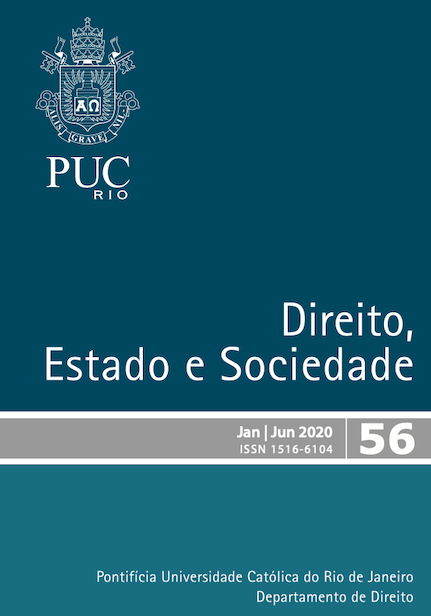Que signifie que les droits de l'homme découlent de la dignité humaine? Utilisation des relations de la métaphysique analytique contemporaine
DOI:
https://doi.org/10.17808/des.56.1546Palavras-chave:
human rights, human dignity, contemporary analytic metaphysicsResumo
J'analyse la stipulation que les droits de l'homme découlent de la dignité humaine. Je propose l'utilisation des outils de la métaphysique analytique contemporaine, concreÌ€tement les relations entre des objets : la réduction, la survenance et la fondation métaphysique. Je prétends que les droits de l'homme sont fondés sur la dignité humaine. J'analyse également quel est le fondement de la dignité humaine et propose la notion naturaliste de ce probleÌ€me: le fondement de la dignité humaine est constitué par la nature humaine découverte par la psychologie évolutionniste. La nature humaine comprise évolutivement peut être regardée comme bonne et, en raison de cela, peut être le fondement de la dignité humaine. Je stipule que la relation entre la dignité humaine et la nature humaine est la fondation métaphysique.Referências
ALLEN, Paul. A critique of Gewirth's "is-ought derivation", Ethics, 92(2), 1982.
BLISS, Ricki, TROGDON, Kelly. Metaphysical Grounding. In: ZALTA, Ed- ward (dir.), The Stanford Encyclopedia of Philosophy, Winter 2016 Edi- tion. Disponível em: <https://plato.stanford.edu/archives/win2016/en- tries/grounding/>. Acesso em: 30/04/20.
BULLINGER, Anke; ZIMMERMANN, Felizitas; KAMINSKI, Julianne; TO- MASELLO, Michael. Different social motives in the gestural commu- nication of chimpanzees and human children, Developmental Sicence 14(1), 2001.
CHALMERS, David; MANLEY, David; WASSERMAN, Ryan (dir.). Metame- taphysics: New Essays on The Foundations of Ontology, Oxford: Oxford University Press, 2009.
CHILOVI, Samuele; PAVLAKOS, George. Law-determination as groun- ding: a common grounding framework for jurisprudence, Legal Theory, 25(1), p. 53-76, 2019.
CORREIA, Fabrice, SCHNIEDER, Benjamin. Grounding: an opinionated introduction. In: CORREIA, Fabrice; SCHNIEDER, Benjamin (dir.), Metaphysical grounding: understanding the structure of reality, Cambridge: Cambridge University Press, 2012.
FINE, Kit. Guide to Ground. In: CORREIA, Fabrice; SCHNIEDER, Benja- min (dir.), Metaphysical grounding: understanding the structure of reality, Cambridge: Cambridge University Press, 2012.
GEWIRTH Alan. Human Rights: Essays on Justification and Application. Chi- cago: University of Chicago Press, 1982.
GIZBERT-STUDNICKI, Tomasz. The Social Sources Thesis, Metaphysics and Metaphilosophy. In: BANAS, Paweł; DYRDA, Adam; STUDNICKI, Tomasz Gizbert (dir.), Metaphilosophy of Law, Oxford-Portland: Hart Publishing, 2016.
GRIFFIN, James. On Human Rights, Oxford: Oxford University Press, 2008. HUME, David. A Treatise of Human Nature, London: John Noon, 1739. KIM, Jaegwon. Supervenience and Mind: Selected Philosophical Essays, Cam-
bridge: Cambridge University Press, 1993.
KIM, Jaegwon. Supervenience, emergence, realization, reduction. In: LOUX, Michael J.; ZIMMERMAN, Dean W. (dir.), The Oxford Handbook of Metaphysics, Oxford: Oxford University Press, 2003.
LEITER, Brian, ETCHEMENDY, Matthew. Naturalism in Legal Philosophy. In: ZALTA, Edward (dir.), The Stanford Encyclopedia of Philosophy, Sum- mer 2017 Edition. Disponível em: <https://plato.stanford.edu/archives/ sum2017/entries/lawphil-naturalism/>. Acesso em: 30/04/20.
LISZKOWSKI, Ulf; CARPENTER, Malinda; STRIANO, Tricia; TOMASEL- LO, Michael. 12- and 18-month-olds point to provide information for others, Journal of Cognitionand Development 7(2), 2006.
LISZKOWSKI, Ulf; CARPENTER, Malinda; TOMASELLO, Michael. Twelve-month-olds communicate helpfully and appropriately for knowledgeable and ignorant partners, Cognition 108(3), 2008.
MCLAUGLIN, Brian; BENNETT, Karen. Supervenience. In: ZALTA, Edward Z (dir.). The Stanford Encyclopedia of Philosophy, Winter 2018 Edition. Disponível em: <https://plato.stanford.edu/archives/win2018/entries/ supervenience/>. Acesso em: 30/04/20.
MILLER, David. Grounding human rights, Critical Review of International Social and Political Philosophy, 15(4), 2012.
MULLIGAN, Kevin; CORREIA, Fabrice. Facts. In: ZALTA, Edward (dir.), The Stanford Encyclopedia of Philosophy, Winter 2017 Edition. Dis- ponível em: <https://plato.stanford.edu/archives/win2017/entries/ facts/>. Acesso em: 30/04/20.
PAPINEAU, David. Naturalism. In: ZALTA, Edward (dir.), The Stanford En- cyclopedia of Philosophy, Winter 2016 Edition. Disponível em: < https:// plato.stanford.edu/archives/win2016/entries/naturalism/>. Acesso em: 20/04/20.
RAZ, Joseph. Human Rights Without Foundation. In: BESSONS, Sa- mantha; TASIOULAS, John (dir.) The Philosophy of International Law, Oxford: Oxford University Press, 2010.
ROSEN, Gideon. Metaphysical Dependence: Grounding and Reduction. In: HALE, Bob; HOFFMANN, Aviv (dir.), Modality: Metaphysics, Logic, and Epistemology, Oxford: Oxford Univerity Press 2010.
SCHAFFER, Jonathan. Monism: The Priority of the Whole, Philosophical Review 119(1), 2010.
SCHAFFER, Jonathan. Grounding, Transitivity and Contrastivity. In: COR- REIA, Fabrice; SCHIEDER, Benjamin (dir.), Metaphysical grounding: un- derstanding the structure of reality, Cambridge: Cambridge University Press, 2012.
TASIOULAS, John. On the Nature of Human Rights. In: ERNST, Gerhard; HEILINGER, Jan-Christoph (dir.), The Philosophy of Human Rights: Contemporary Controversies, Berlin, Boston: De Gruyter, 2011.
TASIOULAS, John. Human Dignity and the Foundations of Human Rights. In: MCCRDUDDEN, Christopher, Understanding human dignity, Oxford: Oxford University Press, 2013.
TASIOULAS, John. On The Foundations of Human Rights. In: CRUFT, Rowan; LIAO, S. Matthew; RENZO, Massimo, Philosophical Foundations of Human Rights, Oxford: Oxford University Press, 2015.
TOMASELLO, Michael. Why We Cooperate? Cambridge, London: A Boston Review Book, 2009.
TOMASELLO, Michael; CARPENTER, Malinda. The Emergence of Social Cognition in Three Young Chimpanzees, Monographs of the Society for Research in Child Development 70 (1), 2005.
VAN RIEL, Raphael; VAN GULICK, Robert. Scientific Reduction. In: ZAL- TA, Edward (dir.), The Stanford Encyclopedia of Philosophy, Spring 2019 Edition. Disponível em: <https://plato.stanford.edu/archives/spr2019/ entries/scientific-reduction/>. Acesso em: 30/04/20.
WITKOWSKI, Ken. The "is-ought" gap: deduction or justification?, Philo- sophy and Phenomenological Research, 36(2), 1975.
ZAÅUSKI, Wojciech (2009). Evolutionary Theory and Legal Philosophy, Cheltenham: Edward Elgar, 2009.
La Déclaration Universelle des droits de l'homme, (1948).
Le Pacte international relatif aux droits civils et politiques, (1966).
Les Explications relatives à la Charte des droits fondamentaux (2007/C
/02), (2007).
La Loi fondamentale pour la République fédérale d'Allemagne, (1949). La Constitution de la République de Pologne, (1997).
Downloads
Publicado
Como Citar
Edição
Seção
Licença
A submissão de artigos para publicação na Revista Direito, Estado e Sociedade implica a concordância dos autores com os seguintes termos:
1. O(s) autor(es) autoriza(m) a publicação do texto em número da Revista;
2. O(s) autor(es) asseguram que o texto submetido é original e inédito e que não está em processo de avaliação em outra(s) revista(s);
3. O(s) autor(es) assumem inteira responsabilidade pelas opiniões, ideias e conceitos sustentados nos textos;
4. O(s) autor(es) concedem aos editores o direito de realizar ajustes textuais e de adequação ao padrão de publicação da Revista;
5. Permite-se a reprodução total ou parcial dos trabalhos, desde que explicitamente citada a fonte.













